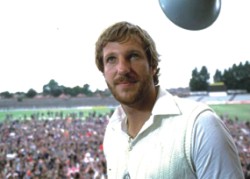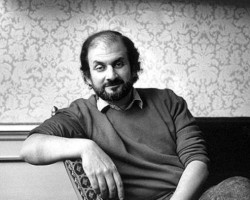| International
Midnights Child and Beefy
Nader Rahman
 |
Ian Botham |
After the cash for honours scandal where not even Prime Minister Tony Blair was spared from investigation, this year the Queens birthday honours list was due to be a rather tame affair. It was also to be Blair's last in an era when almost every footballer in sight was handed an honour, not to mention musicians of all shapes and sizes. In a way the honours list over the past ten years took the “new labour” image to heart, John Majors cricket was replaced with Tony Blair's football and there was generally a new age feel to it all. But in his last year, good old Tony turned it around first by knighting possibly England's greatest sports/showman, no not David Beckham as everyone was expecting (thank goodness for that), but one Ian Terrance Botham, better known as Beefy. Seemingly all of the class of '66 had been knighted (including anyone even remotely related to it) and finally after years a cricketer got a look in, he may be a sprightly 51 years old, but most would argue the award came ten years too late for a man who has deserved it for his services on the field for cricket and off the field for his tireless charity walks in aid of leukaemia research. While in some circles Botham was thought to be a bit of an outlandish choice, as he was an outspoken rebel to say the least but even that move could be called tame compared to the shocking news that Salman Rushdie, author of the infamous Satanic Verses was also handed a knighthood in recognition for his “services to literature”. Both of them are amazingly different personalities, yet at the core of their existence they were both rebels who took apart socially accepted norms and did it with a style and panache of their own, Botham left batsmen, bowlers and fielders in his wake as he dominated all before him, Rushdie reinvented the English language and spun perpetual tales in his novels crafted with his lucid prose. What was to be a tame honours list, turned out to be anything but.
 |
Salman Rushdie |
For Salman Rushdie awards are a dime a dozen, in fact he has won 19 international awards including the Booker, Whitebread Novel Award (twice), Prix du Meilleur Livre Etranger, James Tait Black Memorial and of course the Booker of Bookers, yet even for him receiving a knighthood must have been beyond his wildest fantasies. He was born in Bombay and educated in England and his personal displacement from being entirely Indian or English has never been far from the surface. In most of his books there is an identity struggle, which boiled over into real life as he publicly showed his distaste for England by leaving for New York. He was openly critical of the nation and its politics and thus his acceptance of the award comes as rather startling.
His pedigree is unquestioned, he has been critically well received over the past 25 years and as a storyteller he is second to none. His output has been rich and vibrant but one will never truly mention his name without thinking of that incident. While Midnight's Children is possibly one of the greatest books of the 20th century, that alone will not absolve him from the Shame of The Satanic Verses. Around the world people rioted and in the ensuing violence dozens died over a book which many Muslims believed to be blasphemous. It all culminated on 14th February 1989 when Ayatollah Ruhollah Khomeini, the spiritual leader of Iran at the time put a fatwa out on Salman Rushdie's execution. Less than a month later Britain and Iran broke off diplomatic relations and Rushdie went into exile. To this day every year he receives a special “valentine” from Iran reminding him that there is still a price on his head. For 10 years the British government protected him at an estimated cost of £10 million, one might say they had a lot invested in him.
With or without his controversies he is still one of the finest writers of the modern era and he has been rightly knighted for his services to literature. While most of his novels revolve around politics and the political, his use of language has truly changed the South Asian novel, he pioneered the usage of local words in English writing, so much so that it has become passé now. From a British public school, to Cambridge he epitomised the privileged British-Asian, and left his classical education
behind him as he chutnified the English language to suit his means, and suffice to say the world is better off because it. His writing is anything but ordinary and essentially a knighthood was conferred upon him for just that reason. He was like nothing before him, and for his pure literary genius he richly deserves this recognition. While he may deserve the award, actually giving it to him is a whole different matter as the announcement was followed by protests and burning effigies in Pakistan, Malaysia and unsurprisingly, Iran. Many view it as an openly antagonistic gesture by the British government, essentially acknowledging and accepting his writing in these times of religious uncertainty. In the end it boils down to a point of view, and while Sir Salman may have a nice ring to it, the fact of the matter is, that knighting him is likely to be a thriller of a political disaster, much like many of his early novels.
Rushdie has had his fair share of detractors and the again so has Ian Botham. For him to be knighted would once have been as blasphemous as the Satanic Verses itself, but Beefy as he is known has grown from strength to strength. His natural flair was spotted early by Somerset and his rise to the national team was head-spinningly fast. Soon after his international debut he took the world by storm with his boomerang out swinger, flashy batting and his unusual love for a pint of bitter. He was so devastatingly effective and made the game look so easy, the notion of "proper coaching" to create a player was turned on its head. He was all natural flair and power, backed with an impish temperament, he was a bad boy in an era of straight-laced English footballers (now that is amazing!) as well as a Fleet Street favourite, the working man's David Beckham if one was looking for an understandable analogy.
To say he was larger than life would be an understatement, and during his time he helped England win the Ashes five times, took them to two World Cup finals brought a nation to its knees as he single-handedly won the Ashes in the '81 epic. But for every high there is a low, he by his late 20's he was dogged by injuries and his love of alcohol was getting the better of him. Along with that he was banned for smoking marijuana and it seemed that England's golden boy had lost control. On his return from the ban within 12 balls of his comeback he picked up two wickets, which made him the highest wicket taker of all time in test matches. It even prompted Graham Gooch to famously say, “Who writes your scripts?” That really was the story of his career as he carried the hopes and dreams of a nation on his back and more often than not was their scapegoat in times of failure.
Along with his love for a drink he was never short of a word. Famously calling the selectors “A bunch of gin soaked dodders” along with the politically incorrect statement that “Pakistan is a place to send your mother-in-law for an all expense paid vacation.” He shot from the hip played his cricket with a passion yet to be seen, along the way he picked up 383 wickets, 5200runs and 120 catches to boot. But there is more to him than just his cricket, in 11 fund raising walks he has raised over £10 million for leukaemia research a number which is closer to £100 million through the ripple effect and brought mortality rate down to 20% from 80%. He has walked from John O'Groats to Lands End along with a Hannibal style crossing of the Alps with elephants and everything, all in aid of leukaemia research. His generosity knows no bounds as he plans to continue till the day he dies, a hard cricketer and amazing individual there have been few more deserving of a knighthood. And it must be extra sweet for him as most of his life he has been the outspoken rebel, seeing him in his tails kneeling before the queen will be quite a sight.
Twenty-one years ago, before the fatwa and Botham's two World Cup finals Frank Miller wrote a graphic novel to end all graphic novels. It was the story of Batman set twenty years after he retired and how Gotham city was then overrun with crime. In the story an ageing Batman comes out of retirement to save the city and in the process his character is reinvented as psychologically dark and brooding. The happy-go-lucky image of the 30's Batman and the 60's television series is flipped on its head and the character has never the same. This process of reinvention is what both Botham and Rushdie have had to go through, that is not to say that they were recreated as psychologically dark and brooding. They have both come through different trails and tribulations and their recreation is as epic as Millers aptly named “The Dark Knight Returns.”
Copyright (R) thedailystar.net 2007 |
